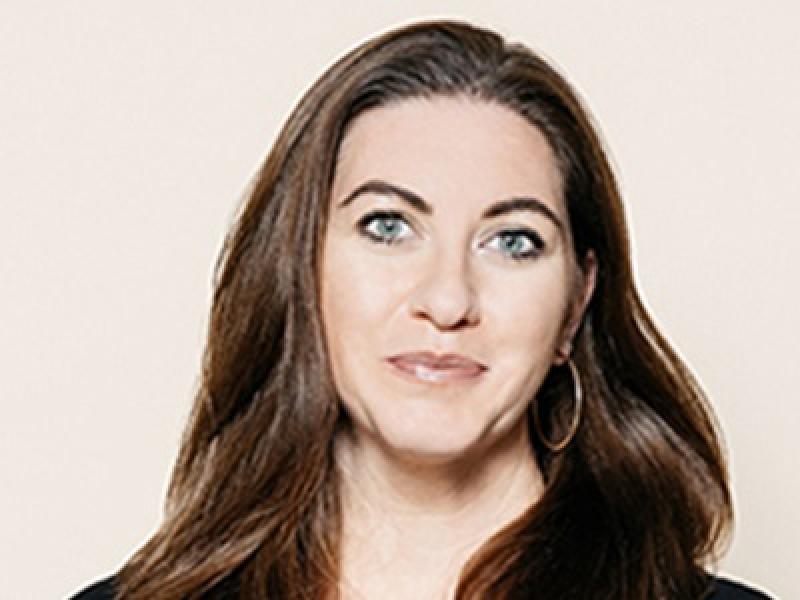
Misty Temelkovski is a sales representative with Colliers in Toronto / Hamilton. (Courtesy Misty Temelkovski)
The future of the workplace is inclusive, and women are slowly being embraced in competitive industries such as commercial real estate and development.
Misty Temelkovski, 36, is one of them.
“I have been trying, for six years, to figure out where the hell I belong in the world of real estate,” said Temelkovski, a sales representative with Colliers International in the Greater Toronto and Hamilton Area. “With these guys on my side, they opened up something I didn’t even know existed.”
She joined the team in September 2018 and says she doesn’t believe gender played a role in her hiring. “It was just the bottom line, and it’s doing the job well and having passion.”
Temelkovski’s father has been in the business for 30 years and despite being a woman in what has traditionally been a man’s field, “I honestly believe that I have just as much of a chance as anyone else to be in a management position,” she said.
She said that wasn’t her experience in some previous positions. “I was very much the black sheep . . . every man would close their mouth and wouldn’t even look at me. . . . Almost like pushing you out the door.”
At other companies, if they did speak to her, Temelkovski said, they automatically assumed she was working in residential.
Future of the Workplace forum
Temelkovski attended the sold-out Future of the Workplace: Partnerships & Innovation to Celebrate IWD2019 panel, hosted by Matrix360. The March 5 event in Toronto honoured International Women’s Day, with Colliers International president of brokerage services Scott Addison and five other CRE leaders candidly discussing the state of the industry.
“Over the last 20 years, there’s been a circular conversation around gender equity, with very little progressive action,” said Matrix360 managing partner Chandran Fernando. “The conversation is stagnant and counterproductive. As a result, women in executive management, C-suite and board suite leadership are on the decline.”
Read our other #IWD2019 Stories:
* Crew M calls for gender equity on RE boards
* IWD panel offers solutions to advance women in CRE
This stagnation is caused by a lack of understanding, he said, along with judgment and “dialogue that is not solutions-driven and more importantly, where men are left out of the conversations.”
Panelists had plenty to say when given a platform and microphone.
A brokerage “can be a great business to raise kids in,” Addison said, but “it’s an intimidating business . . . how do we change that?”
Managers tend to hire carbon copies of themselves, said Addison, adding Colliers now has scouts and recruiters creating a “totally different funnel.”
Changes in place, but are they working?
When it comes to female applicants, though, “it’s too early to tell, really,” if new strategies are making a dent, Addison told RENX. “We’ve got a lot more females coming in the pipeline, so our concern now is ‘are they going to stay?’ ”
Healthy, inclusive workplaces — and employee retention — involve supporting workers heading off on parental leave, dealing with mental health issues, aging parents, or any other matter involving an absence.
“In my business, I provide solutions to my clients,” Paul Morassutti, vice-chairman of valuation and advisory services at CBRE Canada, told RENX. “If all I did was hire white MBAs from Rotman not only would I be bored to tears, I don’t think the service that we provide would be very good. It would be very one-dimensional.”
So how does Morassutti ensure everyone is represented?
“If you’ve got the right culture, the right leadership, and people are serious and sincere about having a company that reflects the city that we work in and the country that we work in, it shouldn’t be that hard to figure out,” Morassutti said. “I still find it frustrating — in 2019 — we’re still talking about these issues.”
Women represent nearly half of all entry-level employees but only 25 per cent of vice-presidents and 15 per cent of CEOs, according to a 2017 McKinsey Global Institute report, which says gender inequality costs Canada roughly $150 billion annually.
Supporting employees who become parents
CBRE is among the trailblazers when it comes to parental leave. Salaried employees are topped up over Employment Insurance, while commissioned employees receive a lump-sum payment, Morassutti said.
It also makes resources available to mothers to “maintain that relationship with their clients because that’s another fear . . . that when you go on maternity leave, not only am I not getting paid, my clients are now going to other brokers.
“This is a way to keep in touch with them and stay sticky with them.”
Then there are men taking parental leave, which “I think is a good thing,” Morassutti said. “The biggest issue . . . is there is this stigma toward men taking time off or men not working as many hours as they can.”
Addison, 59, was raised to believe it’s “wrong” for the man to stay home with the kids. “It takes time to make that change. I honestly do think if big companies started promoting that there’s parental leave, we want the other spouse to take five weeks . . . then it becomes ‘it’s crazy not to.’ ”
“I think if you’ve got great people working for you, trying to support them as they raise a family is a good business decision, in addition to being the right thing to do,” Morassutti said.
Dealing with ‘imposter syndrome’
Successful women also have a responsibility to mentor female talent, said Sunita Mahant, senior director of legal affairs at Ivanhoé Cambridge. One attendee asked about “impostor syndrome” — questioning one’s own accomplishments and success.
“Everybody has a level of insecurity,” said Mahant, who suggested hiring a business coach from outside your industry and seeking out a mentor.
Veronica Maggisano, senior director of development at Oxford Properties, said only you can build a solid foundation of inner confidence.
“I work on that all the time . . . it will be a lifelong thing,” Maggisano told RENX.
Diversity and inclusivity will happen more quickly, Addison said, if team makeup becomes part of the overall scorecard. Ask “What am I doing to create a losing environment?” he said.
Ultimately, “I’ve always wanted to work with smart, talented, bright people,” said Morassutti, “and some of those people are women. Some of those people are people of colour. I want to work with the best that I can.”
Which brings the issue back to Temelkovski and other young women working to build their careers. While happy to now feel she’s on equal footing, Temelkovski hasn’t forgotten her negative experiences.
“Some of the most motivating words someone can say is ‘no, can’t, don’t, never,’ especially coming from a man. This truly fires me up,” said Temelkovski.
“Attitude is everything and dreams do come true.”







